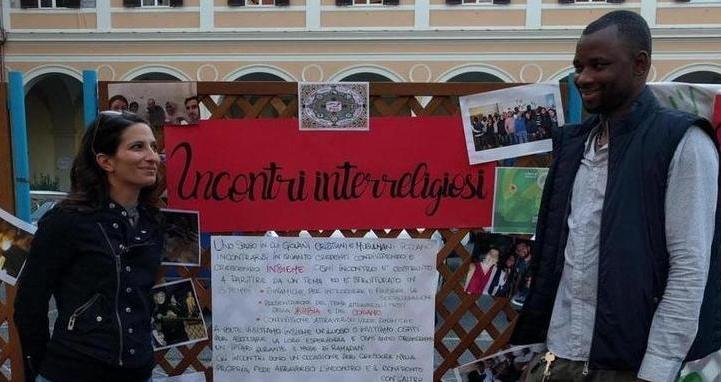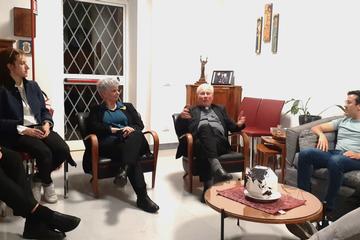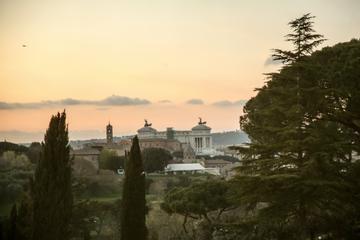
By Heather Walker
ROME — During this month that recognizes the contribution of women in history and in our present time, The Lay Centre is pleased to begin a new monthly series on contemporary women in ecumenical and interreligious dialogue. Our first article in the series features a woman who has helped to advance The Lay Centre mission through communications for several years.
Elena Dini is currently the senior program manager of the John Paul II Center for Interreligious Dialogue, housed at the Pontifical University of St. Thomas Aquinas (Angelicum) in Rome. She holds degrees in Near and Middle Eastern studies, communications, Catholic theology and interfaith dialogue. She has begun her doctoral studies at the Pontifical Gregorian University in the theology of religions.
Among her many activities, she also coordinates interreligious meetings among young people and recent immigrants at the Basilica of the Sacred Heart of Jesus in Rome and serves on the steering committee of the International Abrahamic Forum. We were pleased to sit with her and learn more about her long-time work in ecumenical and interreligious dialogue.
How did you first become interested in the area of communications and journalism?
After high school I decided to study Arabic and I enrolled for a BA in languages and international communications. My focus was not on communications, but I slowly came to realize how important it was to communicate what I was learning. Working on academic articles, being able to research and go deeper into the subjects I was passionate about — which became the field of Jewish-Christian-Muslim dialogue — was vital to me, but I needed to have the tools to convey that to a larger audience in order for dialogue to become more effective in society. Journalism and communications would allow me that chance and I invested in it.
You have vast experience in ecumenical and interreligious dialogue. What inspired you to get so involved in this area?
The first inspiration came from my personal faith involvement. I did not grow up in a very religious family, but at some point, when I was a teenager, I felt strongly that God was not just in books or churches. God was alive and was asking for a place in my life. That’s how all this got started: through my personal path of faith. At the beginning I was only concerned with my own faith, but through the study of the Arabic language I met some Muslims. In particular one of them changed my way of looking at faith. In his eyes I saw the profound faith and love which, until then, I had always associated only with those who met Jesus in their life. That day, I realized that I could not and should not put God in a box. Since then, my life has been a continuous discovery along the path of dialogue.
The Russell Berrie Fellowship and JPII Center for Interreligious Dialogue have been and still are important anchors in your life. Could you tell us about your experience?
I was a Russell Berrie Fellow in 2014-2015. I discovered this fellowship that offers the possibility of doing interreligious studies at the Pontifical University of St. Thomas Aquinas in Rome when I was completing my graduate certificate in interfaith dialogue at Hartford Seminary in Connecticut. I wanted to keep studying dialogue and I was so attracted to the idea of doing that within a Catholic institution — because of my own Catholic faith I wanted to learn more about dialogue from that perspective — with a focus on Jewish-Catholic dialogue. In fact, until then I had worked more in Christian-Muslim dialogue, but I had always wanted to work in the field of Abrahamic relationships and I was eager to receive some training in that direction. That year was really a blessing and it helped me a lot to acquire both knowledge and skills in dialogue. The Israel visit that the John Paul II Center for Interreligious Dialogue organizes every year with its fellows was an opportunity to have first-hand experience of studying with Jews and to meet many people involved in dialogue and networking.
After the fellowship, I appreciated so much the energy invested by the center to create a network of fellowship alumni, the “JPII Leaders of the Center,” who work around the world and support our dialogue projects. Thanks to the availability of alumni grants, I was able to receive funding for some concrete initiatives.
Could you speak about one of your projects?
Thanks to a grant received by the JPII Center, I was able to organize a series of meetings to support teachers of religion in teaching about religious and cultural diversity through theoretical and practical sessions. The course was particularly successful and some participants told me that they would have loved to discover more about the different ways dialogue could be lived and expressed. Therefore, the following year I asked for another grant and I edited a booklet about different experiences of encounter in Jerusalem, specifically designed for teachers and educators.
You are involved in dialogue on the international level but also in the Diocese of Rome, particularly at the Basilica of the Sacred Heart. What is this project about?
Aware of how much I received from dialogue, I started to think about how I could make other people benefit from this dimension of encounter. I am a lay member of a Catholic community, hosted at the Basilica of the Sacred Heart, close to Termini Station in Rome. Among its many pastoral and volunteer activities, we run a project that fosters the socialization of young refugees. Most refugees are Muslim, and most volunteers, like myself, are Christian. Our personal faith is part of our encounter. We sometimes touch upon faith in one-to-one conversations, but we realized there was no space for a larger exchange.
Some Muslim refugees asked to learn more about Christianity to understand the society and culture in which they live, and this was such an important and touching request. Five years ago, we started organizing interreligious meetings between young Italians and young refugees. We always have a core group of people who are deeply committed to these meetings and they tell us that this is a way to both discover the other person’s faith and to go deeper in their own faith. I am excited to represent this project in Network 4 Dialogue, where I keep learning about other experiences in Europe using interreligious and intercultural dialogue for the social inclusion of migrants and refugees.
Before moving into your current role with the JPII Center, you worked at the Vatican. How did those years influence you?
Before accepting the position as senior program manager at the JPII Center for Interreligious Dialogue, the years I worked at the Vatican taught me to have a more universal view of the Church. Catholic means universal, but it is so easy to just associate the Catholic faith to what one is used to doing in one’s own context. I also got the chance of delving into Church documents and following attentively the life of the Church through the teachings of Pope Francis. Finally, I learned that the Church needs us all. Although I intellectually knew that all together we form the Church, the experience of working for the Church made me feel how real that is.
Why is it important for young people to become involved in ecumenical and interreligious dialogue?
Dialogue is not an “addition” to one’s faith. As Pope Francis stated in “Evangelii Gaudium” (“The Joy of the Gospel”), dialogue is “a duty for Christians as well as other religious communities” (250). God is larger than what we grasp with our mind. Already in 1984, the then-Secretariat for non-Christians — today the Pontifical Council for Interreligious Dialogue — stated that “the dynamic of human encounter should lead us Christians to listen to and strive to understand that which other believers communicate to us in order to profit from the gifts which God bestows so generously” (“Dialogue and Mission,” 21).
Let’s allow the Holy Spirit to guide us in dialogue and to surprise us. Let’s walk a path where by meeting the other we know that we will meet God and go deeper in our own faith. And let’s not forget that interreligious dialogue is a religious experience.
For a few years, you supported The Lay Centre’s communications. How was this experience?
I discovered The Lay Centre many years ago, exactly for the pillars of its mission: formation of the laity, Christian unity and interreligious dialogue. It was heartwarming to see how, in the centre of Rome, there is a place where young lay students at pontifical universities could experience these dimensions in community life. It was therefore a pleasure to become a friend of The Lay Centre and to attend events and gatherings over the years. When I got the chance to support its mission through communications, I received so much from each resident scholar, staff member, friend or guest at The Lay Centre that I had the privilege of interviewing. I learned a lot from each of them. This is a place where dialogue and encounters are experienced and lived daily, and this is fascinating.
Photo courtesy Elena Dini - taken at the Basilica of the Sacred Heart in Rome.


